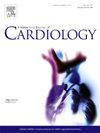Rigor of cardiac device implant training affects performance outcome
IF 3.2
2区 医学
Q2 CARDIAC & CARDIOVASCULAR SYSTEMS
引用次数: 0
Abstract
Background
Cardiac Implantable Electronic Devices (CIED) training for novice implanters typically occurs in vivo, varies across institutions, and results in inconsistent skill levels. We previously demonstrated the superior effects of Proficiency-Based Progression (PBP) training on implanters' performance in a randomized controlled trial (RCT). Beforehand, we conducted a ‘pilot’ study to evaluate the robustness of PBP training, hypothesizing that a substantial majority of trainees would achieve the target proficiency after training.
Methods
In this international, prospective, single-arm study, novice implanters completed a metrics-based simulation training curriculum, requiring proficiency benchmark demonstration at each stage to advance. Trainees ultimately performed a cardiac resynchronization therapy implant on virtual reality simulation which was video-recorded and then scored using validated Metrics (Steps, Critical Errors, Errors non-critical) by independent assessors. The primary outcome was the number of trainees meeting the benchmark. Findings informed corrective actions for the subsequent RCT training, whose effectiveness was verified by comparing PBP-trained participants from the pilot study (PBP-PILOT) and the RCT (PBP-RCT) on Steps completed, All Errors, and benchmark achievement.
Results
Only 17 % achieved the proficiency benchmark. Investigations revealed insufficient faculty adherence to the PBP methodology resulting in premature trainee advancement. Corrective actions improved the subsequent RCT training: compared to the PBP-PILOT group, PBP-RCT trainees completed 15 % more Steps (p = .014), made 69 % fewer All Errors (p = .015), and 93 % met the benchmark (p < .001).
Conclusions
Pilot testing revealed deficiencies in PBP training execution, highlighting the importance of rigor and faculty compliance. Verifying novel curricula before large-scale implementation is crucial to ensuring robust training outcomes.
求助全文
约1分钟内获得全文
求助全文
来源期刊

International journal of cardiology
医学-心血管系统
CiteScore
6.80
自引率
5.70%
发文量
758
审稿时长
44 days
期刊介绍:
The International Journal of Cardiology is devoted to cardiology in the broadest sense. Both basic research and clinical papers can be submitted. The journal serves the interest of both practicing clinicians and researchers.
In addition to original papers, we are launching a range of new manuscript types, including Consensus and Position Papers, Systematic Reviews, Meta-analyses, and Short communications. Case reports are no longer acceptable. Controversial techniques, issues on health policy and social medicine are discussed and serve as useful tools for encouraging debate.
 求助内容:
求助内容: 应助结果提醒方式:
应助结果提醒方式:


